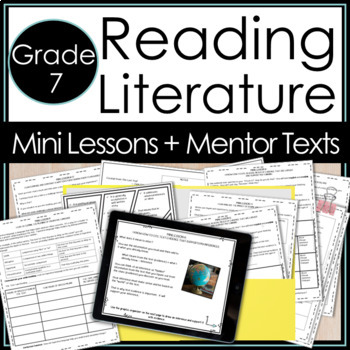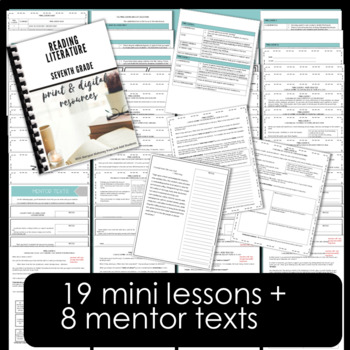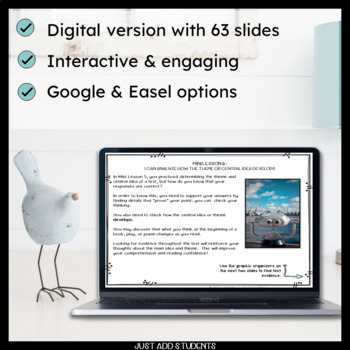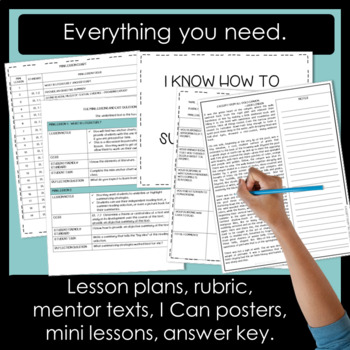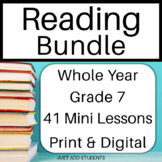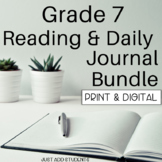Whole Year Mini Lessons for Reading Literature 7th Grade Print and Digital
- PDF
- Google Apps™
- Microsoft OneDrive

Also included in
- You'll be able to teach all the 7th grade reading standards with this print and digital bundle. Use with any texts to differentiate and scaffold. You'll love using these mini lessons to break down tasks into manageable lessons that will help students succeed and grow as readers!Take a look at whatPrice $18.95Original Price $25.98Save $7.03
- This bundle includes everything you need to teach Grade 7 reading. Mini lessons for reading information texts and literature. Mentor texts included. Plus daily journal prompts that will keep your students writing every day!This is what you'll get:The information text resource includes:22 Mini LessPrice $40.00Original Price $55.98Save $15.98
Description
Stop searching for mentor texts and reading lessons! No planning needed to teach all the Gr. 7 reading lit standards! Easy-to-use mini lessons have everything you need to make teaching reading (any) literature text a snap so you'll have more time to work with your students every step of the way!
Provide the scaffolding your students need or increase rigor by using with a variety of texts.
This is what you'll get with this print & digital resource:
- 19 Mini Lessons
- Digital & print - perfect for blended, distance, or in-person learning!
- 19 standards posters written in student-friendly language
- lesson planning charts
- 8 mentor texts you can use to model or assign to get students working right away
- Additional texts are embedded into several lessons.
- Answer Key using the mentor texts. This will give you an idea of how to use the mini lessons with other texts. You may wish to choose your own literary texts.
- "I Can" posters
Each mini lesson includes:
- a manageable portion of the RL standards
- student friendly restatement of the standard
- easy-to-follow explanation of the standard
- A “Demonstrate your Understanding” that directs the student’s task for the day
- Built in assessments with the print page or digital slide
- A “Reflection Question” focuses on higher order thinking skills and helps summarize the mini lesson. Ideal "wrap up" or use as a warm up for the next class.
The 19 mini lessons address:
- What is Literature? Anchor chart
- Provide an objective Summary
- Cite several pieces of textual evidence to provide explicit evidence
- Cite several pieces of textual evidence to prove inferences
- Determine the central idea & theme of the text (+extra practice)
- Analyze the central idea & theme over the course of the text
- Analyze how particular elements of the story interact & shape the plot
- Determine meaning of words & phrases
- Determine meaning of figurative language
- Determine connotative meaning
- Analyze impact of rhymes
- Analyze impact of repetition (alliteration)
- Analyze how poetic structure contributes to meaning
- Analyze how dramatic structure contributes to meaning
- Analyze how the author develops point of view
- Analyze how the author contrasts point of view
- Compare and contrast a written story to a film or audio version
- Compare and contrast fictional portrayal with historical account
- Self-assess reading growth
All of the CCSS Reading Literature for 7th grade addressed in manageable, bite-sized lessons!
8 Mentor texts make this "out of the box" ready to use.
Excerpts from:
- The Last Trail by Zane Grey
- The Wonderful Wizard of Oz by L. Frank Baum
- “All Gold Canyon” by Jack London
- The Jungle Book by Rudyard Kipling
The entire texts of:
- “The Road Not Taken” by Robert Frost (poem)
- “If” by Rudyard Kipling (poem)
- “The Cremation of Sam McGee” by Robert Service (poem)
- “After Twenty Years” by O. Henry (short story)
I note in the answer key which texts I used.
You'll be able to use the mentor texts in many ways including:
- To model your own mini lesson
- Differentiation
- Reteaching
- Small group practice
- Writing mentor texts (teaching description!)
- Vocabulary
- Practicing summarizing skills
- Poetry analysis
- Short story analysis
- Strengthen reading comprehension skills
Reasons to love this workhorse of a resource:
- print & digital means it is ready for any learning environment!
- mentor texts make this "out of the box" ready
- use to differentiate lessons
- craft literature circle lessons
- create GATE activities
- create small groups, reteach skills, or move students on to more complex texts
- decrease scaffolding and increase independence
- provide additional support by repeating the lessons as often as needed to achieve student independence and increased text complexity
- assess mastery. Mini lessons can be used for formative or summative assessments
- can be used with any literary text
- ready to use today
Ready to use today with suggested mentor texts.
You will be able to increase text complexity and student independence by using the mini lesson activities repeatedly throughout the school year with any literary text.
Use this resource again and again with your favorite literature!
Here's teachers are saying about my mini lessons:
- Great resource! You can use these worksheets with ANY novel - isn't that awesome! It's a great resource to use with a sub., apply as a do-now, or 'exit ticket.' The possibilities are endless.
- "I love how this resource breaks down each step of the process for students to make it more manageable."
- "Your organization is outstanding, and your thorough planning (with ALL your mini-lessons) is appreciated more than you know. Even if I, myself, spent days creating a set of mini-lessons to use in class, I don't think they would give me the the comfort and excitement that yours do."
- "I love the option of creating a workbook for them at the beginning of the unit, and I especially love the "I Can" statements at the top of each lesson (my principal will love that, too!). The teacher pages are a huge part of what makes this so amazing, though; your instructions, notes, standards, and lesson calendars are so thorough and incredibly helpful. The name of your store really says it all...Just Add Students!!"
You are going to love how much time this saves you!!
Please view the preview to see what this product includes.
The file includes:
- print mini lesson file
- digital access codes
- 19 lesson plans
- 8 mentor texts
- suggested answer key
Looking for more reading support?
Mini Lessons for Teaching Reading Informational Texts and Literature
You may also be interested in these resources:
8th Grade Reading Informational Texts
21 Mini Lessons for Teaching Narrative Writing
Book Talks: A Guide to Running Successful Book Talks in your Classroom
Dystopian Novels: Ready-to-Go Lessons for Literature Circles
You can check out all my mini lessons here!
I’d love to have you follow my store! Click on the green star to get the latest freebies, sales, and products.
I can't wait to hear from you – please let me know how you use this resource & earn TPT credits at the same time! Questions? Pop them in the Q&A below and I'll get right back to you!
With gratitude,
Marypat

